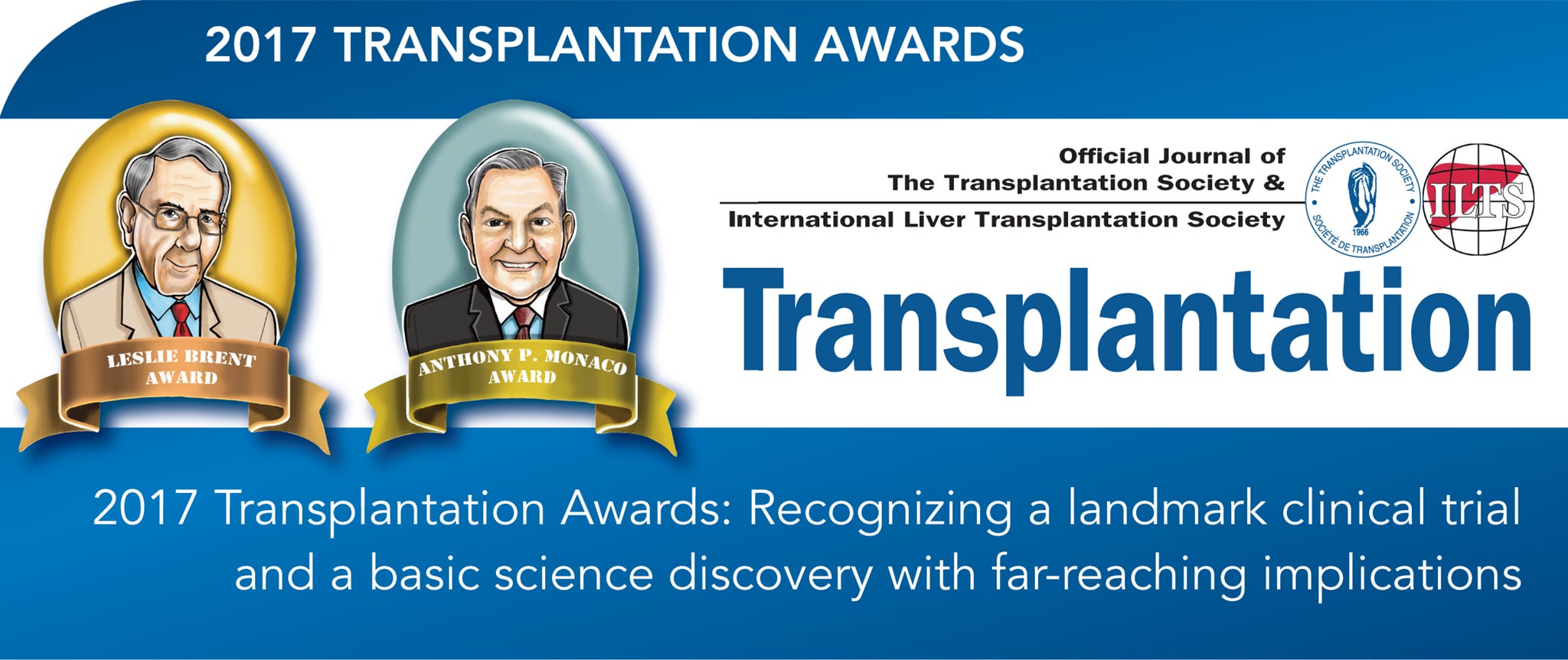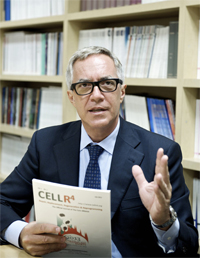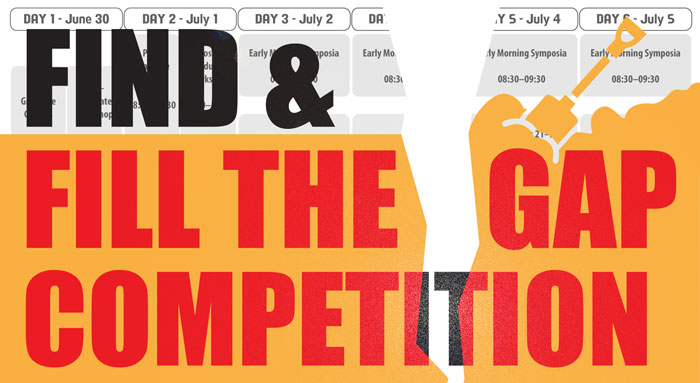
Call for Nominations - Transplantation Science Awards

This year's awards will recognize manuscripts with important implications for transplantation.
Submit your nominations by May 1, 2018. All manuscripts from 2017 are eligible.
CLICK HERE TO DOWNLOAD THE SUBMISSION FORM (MS WORD DOC)
Member News
 Camillo Ricordi, Named a Fellow of National Academy of Inventors
Camillo Ricordi, Named a Fellow of National Academy of Inventors
Dr. Ricordi has been named a Fellow of the National Academy of Inventors (NAI). Election to NAI Fellow status is the highest professional accolade bestowed solely to academic inventors who have demonstrated a prolific spirit of innovation in creating or facilitating outstanding inventions that have made a tangible impact on quality of life, economic development, and welfare of society.
IN THE NEWS
Cardiovascular imaging identifies heart transplant graft rejection before symptoms
December 7 - European Society of Cardiology - Cardiovascular imaging identifies heart transplant graft rejection before symptoms occur, according to research presented today at EuroEcho-Imaging 2017. Early identification could lead to improved treatment and prevent progression to graft failure.
Our Medicare policy for kidney transplants is totally irrational
December 6 - Washington Post - Kidney transplants are universally acknowledged as the best treatment for kidney failure. Compared with remaining on dialysis, transplant recipients live longer, have better quality of life, are more likely to raise a family, have fewer symptoms and incur far fewer health-care costs.
3D-printed ‘living ink’ developed to aid organ transplants and clean up pollution
December 4 - Ink containing bacteria has allowed scientists to create “living materials” with a range of potential applications from skin grafts to cleaning up chemical spills, according to a new study.
Should We Perform Head Transplants?
Led by Emory experts, the official journal of the International Neuroethics Society examines the ethical questions raised by the possibility of the world’s first head transplant, planned to take place in China.
Reduced Demand, Increased Supply: Innovations Are Brightening Liver Transplantation Outcomes
Commentary - The Liver Meeting 2017: American Association for the Study of Liver Diseases (AASLD). At this year's Liver Meeting, we were pleased to hear of the success of a number of somewhat interrelated strategies designed to achieve a better balance between organ supply and demand. The first strategy was reducing the demand through more effective treatment of liver disease, whereas the second relies on expanding the supply of donor organs via the use of livers that would have been previously discarded and the increased use of technical variant grafts, specifically "split" livers (in which the organ is divided and transplanted into two recipients).
Brain remaps itself in child with double hand transplant Organs
December 6 - The first child to undergo a successful hand transplant also is the first child in whom scientists have detected massive changes in how sensations from the hands are represented in the brain.
'Prehabilitation' May Be Key to Obtaining Improved Liver Transplantation Outcomes
December 7 - Malnutrition, which affects 40%-80% of patients awaiting liver transplantation, is associated with increased morbidity and mortality after transplant surgery. Muscle wasting with sarcopenia and functional decline are also increasingly recognized as correlates of excess liver transplant waiting list mortality in patients with cirrhosis.
Many donor kidneys that are discarded may be suitable for transplantation
December 7 - In an analysis of pairs of kidneys from the same donor in which one kidney was used but the other was discarded, the kidneys that were used tended to perform well. The majority of discarded kidneys could have potentially been transplanted with good outcomes.
TTS 2018 Find&FIll the Gap Contest
We want you to contribute to the Congress by finding a gap in the congress program and submitting your own proposal to fill it. Submissions will be reviewed by the Program Committee and the top proposals will be voted on by the community. Winners will be part of the official program and be hosted in the TTS Innovation Studio in the Exhibit Hall.
Notice - 2018 Member Invoices
TTS and Section members were emailed their annual dues invoices last week.
Click here to pay your 2018 dues
Young Members Corner
Lack of Qualified Nephrologists in Low-Income Countries
by Elmi Muller, Chair - Young Members Committee
Qualified nephrologists are scarce in Africa (see Table 1). This results in a big problem providing a service to low-income countries where renal disease is prevalent and renal replacement therapy is limited. It is estimated that there are 10 000 patients on dialysis in Africa with at least 25% of these patients present in South Africa. Incidence of end stage renal disease is highest in South Africa (200-300pmp), but also very prevalent in Egypt (200pmp), Tunisia (133pmp), Morocco (110pmp) and Sudan (150pmp). Data from Central and Southern African countries is not available, so incidence in these areas is probably just as high as in countries where data is collected. Transplantation is available in 5 countries in Africa with living donation only. The only country with an active deceased donation programme is in South Africa.
Table 1: Qualified nephrologists per country
|
Country |
Nr of Nephrologists |
Nephrologists per million population |
|
Mauritius |
8 |
7 |
|
Kenya |
17 |
4.2 |
|
Cameroon |
5 |
2.7 |
|
DRC |
4 |
0.7 |
|
Botswana |
3 |
1.6Su |
|
Sudan |
60 |
1.5 |
|
South Africa |
60 |
1.2 |
|
Nigeria |
160 |
1 |
A survey was sent out to AFRAN members in Sub-Sahara Africa with developing programmes in renal transplantation. The results of the survey are summarized in table 2.
Table 2: Results of survey on transplantation in Sub Sahara Africa:
|
Country |
Nr of Living Donor Transplants during 2009 |
Nr of Deceased Donor transplants during 2009 |
|
Nigeria |
22 |
0 |
|
Ghana |
2 |
0 |
|
Ethiopia |
|
0 |
|
Kenya |
36 |
0 |
|
Morocco |
|
0 |
|
Total |
60 |
0 |
Countries that were not included in this survey, but with active transplantation programmes are South Africa, Tunisia, and Sudan. Algeria, Libya. It is clear that there is a major problem with availability of transplantation compared to prevalence of chronic kidney disease in Africa.
The Young members committee is actively exploring ideas to bring people from the developed world into training opportunities in developing countries and to send doctors from under resourced areas into training positions in the developed world. In 2018 one of our objectives will be to look for funding to explore more of these opportunities.
If you want to know more about this and other initiatives of the Young Member’s Committee, kindly email committees@tts.org.
University of Cape Town Course Announcment
Organ Donation: From Death to Life
Taught by: David Thomson, Critical Care Specialist and Transplant Surgeon
About this course: Considering someone for organ and tissue donation at the end of life is complicated. The boundary between life and death is more complex than ever before and it falls to medical professionals to help clarify a situation at an often confusing and emotionally stressful time.
In this course you will learn about the science behind death determination and when it is possible for deceased organ donation take place. The lectures will cover medical standards at the end of life - from brain death testing, to requesting informed consent from a grieving family. By improving knowledge of good ethical practices, cultural and religious considerations and the logistics of the organ donation process this course will empower the interactions and discussions of medical professionals and the general public at an often confusing time.
This course will help you to ensure that the option of organ donation is compassionately explored in all appropriate situations at the end of life in the best way possible.
Watch the course trailer here https://www.youtube.com/watch?v=Ak-kVtmZGRs
The course is certified for continuing professional development (CPD) points in South Africa.
Deadline Reminders
TTS Officer / Council Nominations - January 31, 2018
TTS is seeking nominations for three Officer positions that will be vacated in 2018: President-Elect, Vice President and Treasurer. In addition, five of the 12 Councilors-at-large will be changing.
Click here for to nominate someone today! (Requires login)
Medawar Prize Nominations - January 31, 2018
The Medawar Prize, named after Society co-founder Sir Peter Medawar, is recognized as the world's highest dedicated award for the most outstanding contributions in the field of transplantation.
Click here for to nominate someone today!
Recognition Award Nominations - January 31, 2018
The Transplantation Society bestows Honours and Awards to recognize individuals contributing to the field of transplantation through outstanding achievement (for basic scientists, clinicians and in developing countries), and mentorship and training. All members of TTS in good standing are eligible to make nominations and to be nominated for these Awards.
Click here for to nominate someone today!
Women in Transplantation Awards - January 31, 2018
The Women in Transplantation (WIT) Steering Committee have created the Woman Leader in Transplantation Award to recognize a woman who has helped further the field of transplantation through research, policies, leadership, initiatives or other regarded contributions. Also created by the WIT Steering Committee, the Unsung Hero Award will be presented to one woman who has had an extraordinary impact in transplantation through community service, volunteering, mentorship or other community based activity.
Contact
Address
The Transplantation Society
International Headquarters
740 Notre-Dame Ouest
Suite 1245
Montréal, QC, H3C 3X6
Canada
Используйте Вавада казино для игры с бонусом — активируйте промокод и начните выигрывать уже сегодня!


